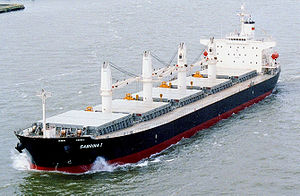
A bulk carrier, bulk freighter, or bulker is a merchant ship specially designed to transport unpackaged bulk cargo, such as grains, coal, ore, and cement in its cargo holds. Since the first specialized bulk carrier was built in 1852, economic forces have fuelled the development of these ships, causing them to grow in size and sophistication. Today's bulkers are specially designed to maximize capacity, safety, efficiency, and durability.
Today, bulkers make up 15% - 17% of the world's merchant fleets and range in size from single-hold mini-bulkers to mammoth ore ships able to carry 400,000Â metric tons of deadweight (DWT). A number of specialized designs exist: some can unload their own cargo, some depend on port facilities for unloading, and some even package the cargo as it is loaded. Over half of all bulkers have Greek, Japanese, or Chinese owners and more than a quarter are registered in Panama. South Korea is the largest single builder of bulkers, and 82% of these ships were built in Asia.
A bulk carrier's crew participates in the loading and unloading of cargo, navigating the ship, and keeping its machinery and equipment properly maintained. Loading and unloading the cargo is difficult, dangerous, and can take up to 120 hours on larger ships. Crews can range in size from three people on the smallest ships to over 30 on the largest.